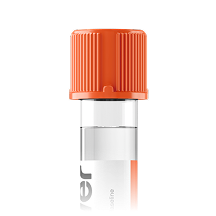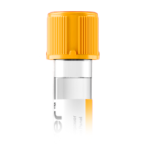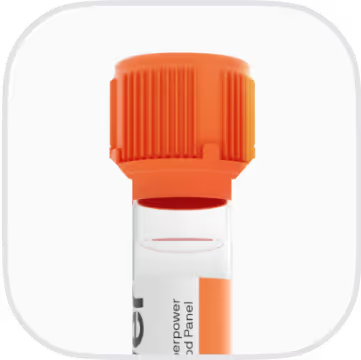Key Benefits
- Spot thyroid autoimmunity by detecting antibodies that target thyroglobulin.
- Flag higher risk for future hypothyroidism due to autoimmune thyroiditis.
- Clarify unexplained fatigue, weight change, or hair loss by indicating thyroid involvement.
- Guide levothyroxine decisions when TSH rises alongside thyroid autoimmunity.
- Support reproductive health by flagging autoimmunity linked to subfertility, miscarriage, and postpartum thyroiditis risk.
- Guide thyroid cancer follow-up by signaling when thyroglobulin blood tests are unreliable.
- Track disease course by trending antibody levels to gauge stability or progression.
- Interpret results most appropriate with TSH, Free T4, and TPO antibodies plus symptoms.
What is a Thyroglobulin Antibodies blood test?
Thyroglobulin antibodies are immune proteins your body makes that target thyroglobulin, a large protein produced only by thyroid cells. Thyroglobulin (Tg) sits inside the thyroid’s follicles as the scaffold on which thyroid hormones are built. When the immune system becomes misdirected, B cells create antibodies against this self-protein (autoantibodies), which then circulate in the bloodstream. A thyroglobulin antibody blood test detects these antibodies and indicates whether the immune system has recognized and responded to Tg.
Their significance is that they signal immune activity directed at the thyroid (thyroid autoimmunity). This loss of tolerance can accompany thyroid inflammation and may disturb normal hormone-building processes. Because thyroglobulin antibodies bind Tg, they can also change how much free thyroglobulin is detectable in blood, which matters when Tg is used to track thyroid tissue. Testing for these antibodies helps reveal whether immune targeting of thyroid proteins is part of the picture and provides important context for interpreting other thyroid-related results.
Why is a Thyroglobulin Antibodies blood test important?
Thyroglobulin antibodies (TgAb) reveal whether your immune system is targeting thyroglobulin, a protein the thyroid uses to make hormones that set the body’s metabolic pace. Because thyroid hormones influence heart rate, energy, mood, temperature, growth, and reproduction, TgAb is a window into whole‑body immune–endocrine balance. It also matters for lab accuracy: these antibodies can distort thyroglobulin measurements used to monitor thyroid cancer.
Most labs consider this test negative or very low in healthy immune tolerance, and “within reference ranges” generally sits near undetectable. When values are low/negative, it usually reflects immune quiet around the thyroid. Metabolism tends to be steady, symptoms are absent, and thyroglobulin cancer surveillance is typically reliable. In pregnancy, low antibodies track with a lower risk of postpartum thyroiditis; in children and teens, they align with stable growth and neurocognitive development.
Higher values indicate autoimmune recognition of the thyroid, most often in Hashimoto’s thyroiditis and sometimes in Graves’ disease. People may feel effects of drifting thyroid function: fatigue, weight change, cold or heat intolerance, dry skin or hair loss, mood shifts, palpitations, menstrual irregularity, and fertility challenges. Women are affected more often, with added postpartum risk; in youth, antibodies can precede autoimmune hypothyroidism and impact growth and school performance. Elevated TgAb can make thyroglobulin appear falsely low, complicating thyroid cancer follow‑up.
Big picture, TgAb links immunity and metabolism. Interpreted alongside TSH, free T4/T3, and thyroid peroxidase antibodies, it helps predict long‑term risk of hypothyroidism, clarifies autoimmune thyroid disease, and safeguards accuracy in thyroid cancer monitoring.
What insights will I get?
This test measures antibodies against thyroglobulin (TgAb), the protein scaffold for thyroid hormone. TgAb mark immune targeting of the thyroid, which can alter hormone production that drives energy use, cardiovascular tone, brain function, and reproduction.
Low values usually reflect preserved immune tolerance and a quiet thyroid. System effects are minimal, with steady energy, metabolism, and cognition because hormone synthesis is unlikely to be impaired. In pregnancy and childhood, low/negative TgAb signal low risk for autoimmune thyroiditis.
Being in range suggests antibodies are undetectable or very low, consistent with stable thyroid architecture and reliable hormone output. Future hypothyroidism risk is lower, and thyroglobulin tumor-marker tests are more dependable when TgAb are absent. Optimal tends to be near zero.
High values usually reflect autoimmune thyroiditis (commonly Hashimoto’s), can appear in Graves disease, and may rise postpartum. They often precede TSH or free T4 changes and signal higher likelihood of fluctuation and eventual hypothyroidism. They are more common in women and with age. TgAb can interfere with thyroglobulin assays used in thyroid cancer follow-up.
Notes: Cutoffs vary by method and are not interchangeable across labs. Titers fluctuate over time and can increase with thyroid injury, biopsy, or immune-modulating drugs. Iodine imbalance and other autoimmune diseases can coexist. TgAb do not reflect hormone levels; interpret with TSH and free T4.


.svg)









.avif)



.svg)





.svg)


.svg)


.svg)

.avif)
.svg)










.avif)
.avif)



.avif)







.png)

.avif)


